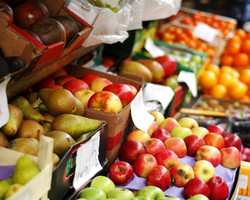Brest, France, tackles food insecurity during the COVID-19 pandemic

Johannah Jorgensen
Brest, France, was heavily bombed in 1944 but quickly and impressively rebuilt itself with high ambitions and an innovative vision. Now, the city is solving the puzzle of food insecurity during the pandemic using a novel approach integrated into social protection programmes and a digital platform.
“In Brest, we have chosen to act vigorously, with all the actors involved alongside us, so that this global health crisis and its consequences on our territory do not also translate into a strong social crisis,” says Brest Mayor François Cuillandre. “We all understand how the consequences are already very hard for the weakest and the poorest among us. The virus puts everyone at risk. It endangers our collective actions, our way of living together, of forming society. Every day we see how much harder it is for the most fragile among us. This obliges us to continue to strengthen our actions of solidarity.”
During the COVID-19 pandemic, Brest has expanded its emergency food provision, launching a referral system to identify those most vulnerable and distribute food vouchers to selected families for use in the majority of open grocery stores.
Despite the various social protection programmes that have been implemented, the closure of markets was a challenge because consumers and local food producers heavily relied on the neighbourhood markets. As part of the digital platform, an interactive map of local food producers was created, connecting residents with a nutritious food supply. For each food producer, the map displays the location, type of produce on offer, how to order, options for delivery and/or collection and contact details. The map is widely promoted through their websites and social media platforms.
“The right to healthy food is something that all levels of government need to be working towards,” says Dr Hans Henri P. Kluge, WHO Regional Director for Europe. “The city of Brest has taken proactive, effective measures to ensure food security for its residents. It is a good example of a government taking care of its people during a national crisis.”
Brest’s policy action to protect food supply during the pandemic builds on their existing commitment to healthy and sustainable diets for all, through the Projet Alimentaire Métropolitain (Metropolitan Food Project). The Project looks at how to improve access to food that is healthy, locally produced and affordable.
Ongoing initiatives include the creation of community food gardens, transition to organic produce in public sector settings, like school canteens, and the creation of a cooperative supermarket. Brest is prioritizing co-production and engagement with the community, including through community consultation picnics. Its programmes also aim to support other cross-cutting issues relevant to a healthy food ecosystem, such as employment, water quality and the reduction of greenhouse gas emissions.
COVID-19 restrictive measures can challenge people’s ability to access healthy diets in the immediate and longer term, but actions by cities during the pandemic can help mitigate both. Local authorities can work to promote access to healthy food during the pandemic, while also looking at the sustainability of these measures and how they might fit within longer-term programmes and policies around nutrition and local food systems.



